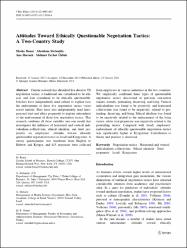| dc.contributor.author | Banai, Moshe | |
| dc.contributor.author | Stefanidis, Abraham | |
| dc.contributor.author | Shetach, Ana | |
| dc.contributor.author | Ozbek, Mehmet Ferhat | |
| dc.date.accessioned | 2014-09-18T08:56:06Z | |
| dc.date.available | 2014-09-18T08:56:06Z | |
| dc.date.issued | 2014 | |
| dc.identifier.issn | 0167-4544 | |
| dc.identifier.issn | 1573-0697 | |
| dc.identifier.uri | https://doi.org/10.1007/s10551-013-2016-4 | |
| dc.description.abstract | Current research has identified five discrete US negotiation tactics, a traditional one considered to be ethical, and four considered to be ethically questionable. Scholars have independently used culture to explain how the endorsement of these five negotiation tactics varies across nations. They have also independently used interpersonal trust and ethics propensity to explain antecedents of the endorsement of those five negotiation tactics. This research combines all those variables into one model that investigates the influence of horizontal and vertical individualism-collectivism, ethical idealism, and trust propensity on employees' attitudes toward ethically questionable negotiation tactics in Israel and Kyrgyzstan. A survey questionnaire was translated from English to Hebrew and Kyrgyz, and 615 responses were collected from employees in various industries in the two countries. We empirically confirmed three types of questionable negotiation tactics discovered in previous one-nation studies, namely, pretending, deceiving, and lying. Vertical individualism was found to be positively, and horizontal collectivism was found to be negatively, related to pretending, deceiving, and lying. Ethical idealism was found to be negatively related to the endorsement of the lying tactics, while trust propensity was negatively related to the pretending tactics. Compared with Israel, employees' endorsement of ethically questionable negotiation tactics was significantly higher in Kyrgyzstan. Contribution to theory and practice is discussed. | en_US |
| dc.language.iso | eng | en_US |
| dc.publisher | Springer | en_US |
| dc.relation.ispartof | Journal of Business Ethics | en_US |
| dc.rights | info:eu-repo/semantics/closedAccess | en_US |
| dc.subject | Negotiation tactics Horizontal and vertical individualism–collectivism Ethical idealism Trust propensity Israel Kyrgyzstan | en_US |
| dc.title | Attitudes Toward Ethically Questionable Negotiation Tactics: A Two-Country Study | en_US |
| dc.type | article | en_US |
| dc.relation.publicationcategory | Makale - Uluslararası Hakemli Dergi - Kurum Öğretim Elemanı | en_US |
| dc.description.wospublicationid | WOS:000341491900008 | en_US |
| dc.description.scopuspublicationid | 2-s2.0-84957971511 | en_US |
| dc.department | Gümüşhane Üniversitesi | en_US |
| dc.authorid | Stefanidis, Abraham / 0000-0002-7677-1720 | |
| dc.identifier.volume | 123 | en_US |
| dc.identifier.issue | 4 | en_US |
| dc.identifier.startpage | 669 | en_US |
| dc.identifier.doi | 10.1007/s10551-013-2016-4 | |
| dc.identifier.endpage | 685 | en_US |
| dc.authorscopusid | 7003538917 | |
| dc.authorscopusid | 55605619400 | |
| dc.authorscopusid | 35088821000 | |
| dc.authorscopusid | 55956532100 | |


















